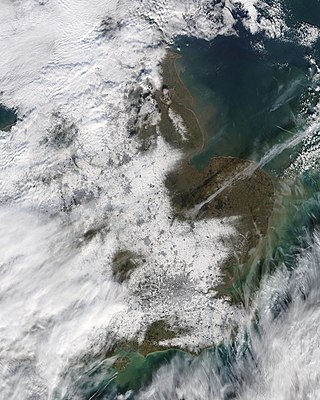
Severe storms in Australia refers to the storms, including cyclones, which have caused severe damage in Australia.

A series of large floods occurred in parts of the United Kingdom during the summer of 2007. The worst of the flooding occurred across parts of Northern Ireland and Scotland on 14 June; East Yorkshire and the Midlands on 15 June; Yorkshire, the Midlands, Gloucestershire, Herefordshire and Worcestershire on 25 June; and Gloucestershire, Herefordshire, Worcestershire, Oxfordshire, Berkshire and South Wales on 28 July 2007.

The February 2009 Great Britain and Ireland snowfall was a prolonged period of snowfall that began on 1 February 2009. Some areas experienced their largest snowfall levels in 18 years. Snow fell over much of Western Europe. The United Kingdom's Met Office and Ireland's Met Éireann issued severe weather warnings in anticipation of the snowfall. More than 30 centimetres (12 in) of snow fell on parts of the North Downs and over 20 cm (8 in) in parts of the London area. Such snow accumulation is uncommon in London. On the morning of 6 February the majority of Great Britain and Ireland had snow cover, with the area surrounding the Bristol Channel being most affected – 55 cm (22 in) had settled overnight around Okehampton, Devon, South West England with similar depths in South Wales. In Ireland the highest totals were recorded around East Kildare and County Wicklow where up to 28 cm (11 in) fell around Naas, County Kildare and even more along the Wicklow Mountains. The last time such widespread snowfall affected Britain was in February 1991. On the 2nd a total of 32 cm (13 in) had fallen in Leatherhead, Surrey just south of the M25. Also 30 cm (12 in) had fallen over the South Downs and 26 cm (10 in) in higher areas of Brighton.

The 2009 Great Britain and Ireland floods were a weather event that affected parts of Great Britain and Ireland throughout November and into December 2009. November was the wettest month across the United Kingdom since records began in 1914 and had well above average temperatures. The worst affected area in Great Britain was the English county of Cumbria. The Irish counties of Clare, Cork, Galway and Westmeath were among the worst affected areas of Ireland.

The global weather activity of 2010 includes major meteorological events in the Earth's atmosphere during the year, including winter storms, hailstorms, out of season monsoon rain storms, extratropical cyclones, gales, microbursts, flooding, rainstorms, tropical cyclones, and other severe weather events.
Global weather activity of 2009 profiles the major worldwide storms, including blizzards, tornadoes, ice storms, tropical cyclones and other meteorogical events, from January 1, 2009, to December 31, 2009. Wintery storms are events in which the dominant varieties of precipitation are forms that only occur at cold temperatures, such as snow or sleet, or a rainstorm where ground temperatures are cold enough to allow ice to form. It may be marked by strong wind, thunder and lightning, heavy precipitation, such as ice, or wind transporting some substance through the atmosphere. Summer storms including flooding, severe thunderstorms and extratropical cyclones are also included in this list to a certain extent.

Cyclone Carmen was an extratropical cyclone and European windstorm which crossed the Atlantic Ocean and affected the United Kingdom, Ireland, France, Belgium, and the Netherlands in November 2010.

The 2012 Great Britain and Ireland floods were a series of weather events that affected parts of Great Britain and Ireland periodically during the course of 2012 and on through the winter into 2013. The beginning of 2012 saw much of the United Kingdom experiencing droughts and a heat wave in March. A series of low pressure systems steered by the jet stream brought the wettest April in 100 years, and flooding across Britain and Ireland. Continuing through May and leading to the wettest beginning to June in 150 years, with flooding and extreme events occurring periodically throughout Britain and parts of Atlantic Europe.

Cyclone Anne was a European windstorm which caused €75 million in damage across western Europe in early January 2014, followed days later by Cyclone Christina.

The 2013–2014 United Kingdom winter floods saw areas of the United Kingdom inundated following severe storms. The south of England saw heavy rainfalls associated with these storms which caused widespread flooding, power cuts and major disruptions to transport. Economically, the worst affected areas were Somerset, Devon, Dorset and Cornwall in the south west and the Thames Valley in the south east.

The 2015–2016 Great Britain and Ireland floods were a series of heavy rainfall events which led to flooding during the winter of late 2015 and early 2016. 11 named storms produced record level rainfall from November 2015 - March 2016 in both monthly and seasonal accumulation records.

In June 2016, parts of the United Kingdom were struck by serious flash floods. Starting on 7 June, thunderstorms caused intense rainfall in many locations across the country, particularly in the north of England and in London, causing repeated flash floods in several locations on a daily basis.

Between November 2019 and February 2020, severe winter flooding occurred across the United Kingdom. The first wave of flooding occurred in November 2019, mainly affecting Yorkshire and the Humber, the East Midlands and the West Midlands. Further isolated flooding incidents were reported in December and January, before the second main wave of flooding, caused by Storms Ciara and Dennis, occurred in February 2020. The excessive rainfall resulted in the wettest February since records began, in 1766, in England and Wales with an average of 169.6 millimetres (6.68 in) falling across the regions, beating the record from 1833.

The 2022 United Kingdom heatwaves were part of several heatwaves across Europe and North Africa. The United Kingdom experienced three heatwaves; the first was for three days in June, the second for three days in July, and the third for six days in August. Climatologists say the extreme heat was due to climate change. 2022 was the UK's warmest year since records began in 1884, with an average annual temperature above 10 °C (50 °F) for the first time. The 2022 heatwaves contributed to the death of nearly 3000 people, most of whom were 65 years or older.

The 2022–23 European windstorm season was the deadliest and costliest European windstorm season on record, mainly because of the impact in northern Libya of Storm Daniel, which became the deadliest and costliest medicane ever recorded as well as the deadliest tropical or subtropical system worldwide since 2008.

Throughout 2022, between February and November, areas of the United Kingdom experienced significant flooding. The first wave of flooding occurred in February as Storm Franklin caused severe disruption across the country.

In July 2023, multiple rounds of heavy rainfall led to a destructive and significant flash flood event occurring in the Northeastern United States beginning from July 9 to 29, 2023. The floods were caused by slow-moving showers and thunderstorms that produced heavy rainfall and flooding over areas that were already saturated by rainfall that took place several weeks prior, especially across the Northeastern and Mid-Atlantic regions. However, the heaviest and most destructive flash flooding was concentrated around northern New England, especially Vermont and New York as widespread rain amounts of 6 inches (150 mm) fell in the two states on July 9–11. Additionally, downtown Montpelier, Vermont was flooded, along with numerous state roads being closed as a result of it; the highest rainfall total from the event was centered in Putnam Valley, New York, with 10.49 inches (266 mm). Across the affected areas, numerous roads and bridges were washed out, and dozens of water rescues were conducted. Transportation service was impacted by the heavy rainfall and flooding, including Amtrak in New York and Vermont and Boston's MBTA subway. The flash floods caused 12 fatalities across several states at least $2.2 billion in damage. The event was known as the Great Vermont Flood of 10–11 July 2023 by the National Weather Service in Burlington, Vermont after its significant impacts in the state on the respective dates.

The 2023–2024 European windstorm season was the ninth season of the European windstorm naming in Europe. It comprised a year, from 1 September 2023 to 31 August 2024. This was the fifth season where the Netherlands participated, alongside the United Kingdom's Met Office and Ireland's Met Éireann in the western group. The Portuguese, Spanish, French and Belgian meteorological agencies collaborated for the seventh time, joined by Luxembourg's agency. This was the third season where Greece, Israel and Cyprus, and Italy, Slovenia, Croatia, Montenegro, North Macedonia and Malta named storms which affected their areas.

Storm Ciarán, known in Germany as Storm Emir was a European windstorm that severely affected parts of Europe from late October to early November 2023. Part of the 2023–24 European windstorm season, Ciarán impacted northwestern Europe and killed 21 people, eleven of whom were in Italy and four in France. It also caused mass disruption to transport. Widespread damage from 100 miles per hour (160 km/h) winds were reported in the Channel Islands, while 1.2 million French households were left without electricity.
In 2024, the United Kingdom experienced flooding. In early January, Storm Henk resulted in severe weather warnings and floods across the English Midlands. In April, flooding was widespread across England particularly on the south coast and the North East in the aftermath of Storm Kathleen and Storm Pierrick. In late November, there was widespread flooding as a result of Storm Bert.

















